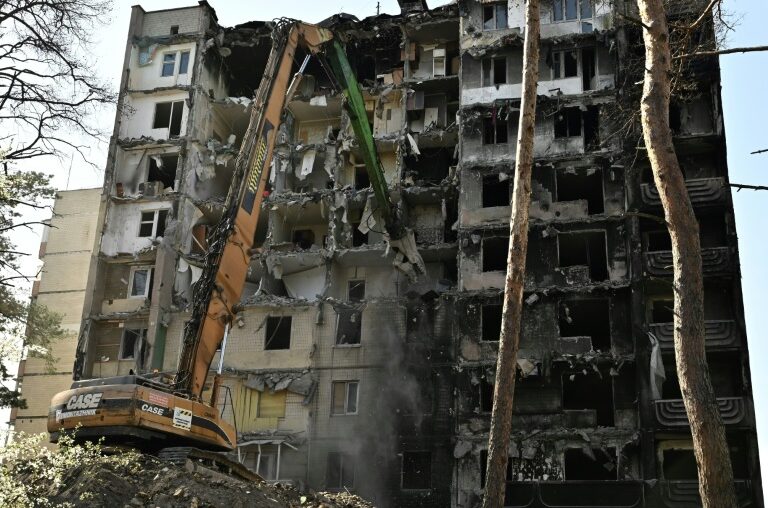When Bart Gruyaert agreed to help rebuild destroyed apartment blocks outside Kyiv, he hoped to be one cog in Ukraine’s vast reconstruction programme, repairing just some of the damage wrought by Russia’s invasion.
But when the French company he works for, Neo-Eco, applied for building permits in the town of Gostomel, the local military administration asked the company to transfer the funds for the multimillion-dollar project to its bank account, under the pretence that it would run the project directly.
Officials told Gruyaert, “it’s better if you transfer the money you received to our account,” he recalled.
“But it doesn’t work like that,” he told AFP.
The company refused, and progress on the initiative, which had secured 20 million euros in private funding, immediately slowed.
It marked the latest example of the endemic corruption that has plagued Ukraine since it became independent after the fall of the Soviet Union in 1991.
After Neo-Eco’s refusal on the bank transfer, the local administration started dragging things out, adding new requirements to the contract and trying to incentivise the company to “give envelopes” to the right people, Gruyaert alleged.
The company reluctantly decided to abandon the project in September 2023, saying it was “impossible” to work under such conditions.
Following the saga, Ukrainian investigators said they had uncovered a system of “embezzlement” in the Gostomel military administration and accused its head Sergiy Borysiuk of appropriating around 21 million hryvnia ($470,000) meant for the reconstruction of houses and apartments.
In June 2023, after the allegations surfaced, Borysiuk was dismissed by President Volodymyr Zelensky.
He had pre-empted his removal with a press conference several days earlier in which he said he had done “everything possible” to ensure reconstruction efforts.
“It seems to me that you are looking for the enemy in the wrong place,” he said.
– Deep corruption –
The case is far from isolated.
Even though Ukraine has stepped up its anti-graft measures over the past decade to advance its ambition of joining the European Union, corruption scandals are still rife.
Transparency International ranked Ukraine 104 out of 180 countries in its “corruption perceptions index,” up from 144 in 2013.
For some officials, Russia’s invasion has provided new opportunities for personal enrichment.
Several high-profile cases of alleged embezzlement of reconstruction funds, as well as the arrest of officials for selling army exemption certificates, have emerged throughout the war.
While a potential embarrassment for Ukraine, which relies on billions of dollars in Western financial support, Transparency International Ukraine’s director Andriy Borovyk said attention to the cases showed the problem was not being “forgotten”.
And authorities also tout the uncovering of such schemes as a sign of “effective” enforcement.
Just 10 years ago, “who could have thought that senior officials could be accused of crimes?” said Viktor Pavlushchyk, head of the National Agency on Corruption Prevention.
“Now we have some very good examples,” he said.
Around 500 corruption cases have been opened this year and 60 convictions secured, according to the National Anti-Corruption Bureau.
– Anti-corruption ‘DREAM’ –
But there are lingering fears the persistent problem will hamper Ukraine’s massive reconstruction agenda, deterring international partners from putting up funds.
The total cost of reconstructing Ukraine stands is estimated at $486 billion, according to a joint study by the World Bank, UN, EU and Ukrainian government.
Gruyaert has not been deterred by his experience in Gostomel, which was occupied by Russian forces in the first weeks of the February 2022 invasion.
Ukraine is “making a lot of progress” on corruption, Gruyaert said, adding that Neo-Eco has had to learn how to “zigzag between the various obstacles”.
The company is still working on several other projects and encourages other foreign investors to get involved.
But, bruised by the Gostomel experience, it now prioritises working with cities where it has confidence it will not be asked for kickbacks.
Most concede that much remains to be done in Ukraine’s anti-corruption fight, especially when it comes to reconstruction.
It is still common for local officials to have stakes in construction companies through their relatives, several figures told AFP.
Ukraine is trying to weed out such conflicts of interest and make the whole process more transparent.
Last year, the country launched a platform listing all open projects.
Called “DREAM”, the aim is to enable investors, journalists and Ukrainians to track the progress of construction projects, said its head Viktor Nestulia.
A commitment to such openness will be key to reassuring foreign investors, said Mustafa Nayyem, an activist and journalist who headed the reconstruction agency until earlier this year.
“The war is not an excuse not to fight corruption,” he told AFP.
Corruption, “is not in Ukrainian DNA, it’s simply a question of will.”
led-jc/jbr/yad

